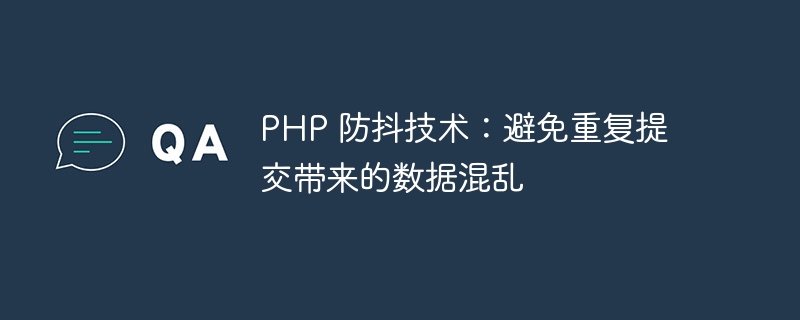

PHP anti-shake technology: To avoid data confusion caused by repeated submissions, specific code examples are needed
Introduction:
When developing web applications, we often You will encounter the problem of repeated submissions by users. Repeated submissions by users will lead to data confusion and inconsistency, bringing unnecessary burden and security risks to the system. In order to solve this problem, we can use PHP's anti-shake technology to avoid data confusion caused by repeated submissions by users. This article will introduce what anti-shake technology is and give specific code examples.
What is anti-shake technology?
Anti-shake technology is a commonly used technology in front-end and back-end development to avoid repeated triggering. The basic principle is to avoid performing the same operation multiple times by ignoring repeated trigger events for a period of time. In PHP, we can determine whether the duplicate submission has been processed by setting a specific flag.
Specific code example:
The following is a simple PHP code example that demonstrates how to use anti-shake technology to handle the user's repeated submission problem.
<?php
// 判断是否已经处理过重复提交
if(isset($_SESSION['isProcessed'])){
echo '请勿重复提交';
exit;
}
// 标记为已处理
$_SESSION['isProcessed'] = true;
// 处理具体的业务逻辑
// ...
// 清除标记
unset($_SESSION['isProcessed']);
?>In the above code example, we first determine whether duplicate submissions have been processed, and use isset($_SESSION['isProcessed']) to determine whether it has been setisProcessed flag. If it has been set, it means that the duplicate submission has been processed, and the prompt message will be output directly and exit. If it is not set, it means the first submission. We will set the isProcessed flag to true and perform specific business logic processing. After the processing is completed, we clear the flag bit through unset($_SESSION['isProcessed']) so that it can be resubmitted next time.
It should be noted that the above code uses PHP's $_SESSION to save the flag bit, ensuring that it can be normally judged whether repeated submissions have been processed in the same session. At the same time, the flag bit can be saved in the database or other persistent storage as needed.
Conclusion:
By using PHP's anti-shake technology, we can effectively avoid the data confusion caused by repeated submissions. The use of anti-shake technology can ensure that each request will only execute relevant business logic once, avoiding system burden and data errors. In actual development, we can adjust the anti-shake time interval and the way to save flags according to specific needs. I hope the code examples in this article can help you better understand and apply PHP's anti-shake technology.
The above is the detailed content of PHP anti-shake technology: avoid data confusion caused by repeated submissions. For more information, please follow other related articles on the PHP Chinese website!